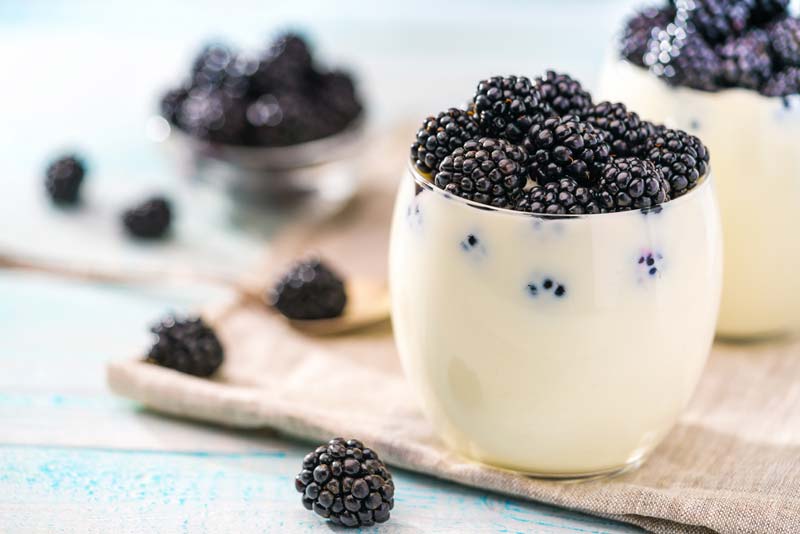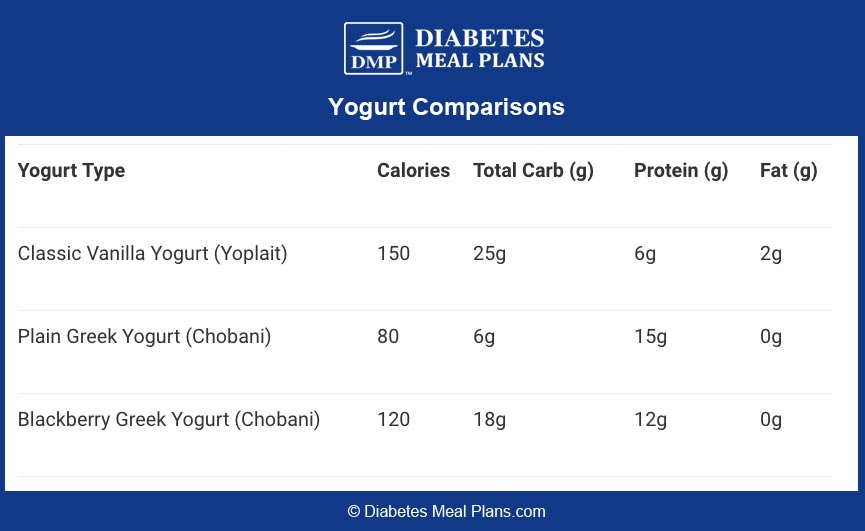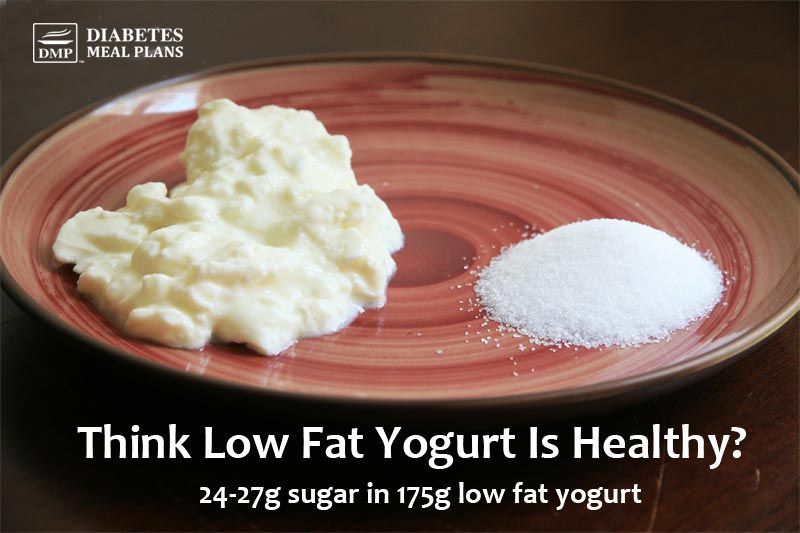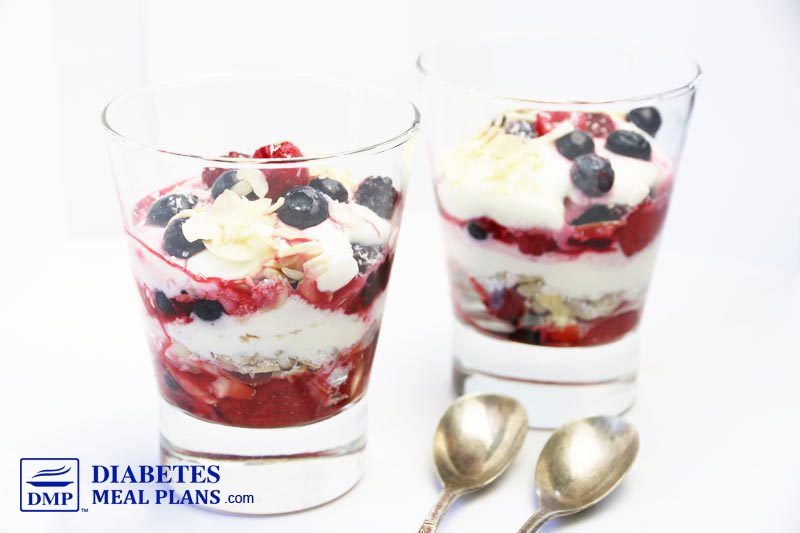Did you know that yogurt is a protein, carbohydrate and fat? And in terms of type 2 diabetes or prediabetes, yogurt can make a great addition to your diet, if you choose wisely.
Read on to discover everything you need to know about type 2 diabetes and yogurt.

Yogurt Varieties and Origins
Just looking at the dairy aisle can make your head spin because these days, yogurt comes in so many varieties!
There’s Greek yogurt, classic yogurt, plain yogurt, flavored yogurt, yogurt with fruit, sugar free yogurt, and many other varieties of this creamy oh-so-good favorite. ;)
Most of us know what yogurt is, but if you don’t know how it’s made, it’s a pretty simple process.
Most yogurt starts out as plain cow’s milk or cream. Once lactic bacteria (known as “live cultures”) are added to the milk it begins to ferment, which gives yogurt its tangy, distinctive flavor. And makes it beneficial for your digestion, too!
For instance, you may have heard on advertisements that yogurt contains “probiotics” that strengthen your digestion. And this certainly is true – strains of friendly bacteria like lactobacillus and acidophilus remain intact in the yogurt, even after processing. And these beneficial bacteria end up in your gut, promoting better health (Hint: yes, yogurt is good for you!).
Yogurt Nutrition Facts
To put it simply: not all yogurt is created equal, so beware!
Different brands and flavors of yogurt contain different syrups, sweeteners, and flavorings that contribute to their “diabetes friendliness” grade. Some yogurt options get a passing score while others get a big fat “F.”
The prime reason that many of these yogurts flop so hard is due to their “added sugar” content. Since it all comes down to keeping your carbohydrate count under control in order to regulate blood sugar and A1c levels, this can be difficult when you indulge in a high sugar yogurty breakfast or dessert.
Let’s get a better grasp on the amount of carbs we’re dealing with here by looking at a nutrition label from a Yoplait brand classic vanilla yogurt.
INGREDIENTS
MILK, MILK SOLIDS, SKIM MILK, WATER, SUGAR, FRUCTOSE, CORN STARCH, HALAL GELATINE, NATURAL FLAVOUR, ACIDITY REGULATORS (CITRIC ACID, SODIUM CITRATE), PRESERVATIVE (POTASSIUM SORBATE), VANILLA BEAN SEED (MIN. 0.01%), NATURAL COLOUR (CAROTENE), YOGHURT CULTURES: (S.THERMOPHILUS & L.BULGARICUS).
Per 175 gram serve:
- Calories: 158
- Protein: 0.1 g
- Fat: 3.3 g
- Carbs: 23.5 g
- Sugars: 22.5 g
Right off the bat you’ll notice a whopping 23.5 grams of carbs in one serving of the yogurt!
As already stated above, many yogurts will be the victim of various added sugars and refined carb ingredients. The Yoplait brand adding sugar, fructose, and corn starch to their ingredient profile.
On the other hand, if you choose plain Greek yogurt, which we encourage you to do, you’ll consume approximately (per half cup, 112 g):
- Calories: 80
- Protein: 11 g
- Fat: 2.5 g
- Carbs: 8 g
- Sugar: 1 g
Plain Greek yogurt has got a much greater quantity of protein and a much lower carb content as well, which makes it a more balanced option and a better choice for people with type 2 diabetes or prediabetes.
Choosing the right type of yogurt is of key importance here because the nutrition quality is going to differ greatly.
Comparing Different Yogurts
If eating low carb is your goal (which it should be!) then Greek yogurt is going to be your friend.
Greek yogurt is strained differently during processing, which makes it thicker, creamier, and higher in protein than regular yogurt is.
It also tends to be lower in sugar and carbs, which is a major advantage.
Compare the three yogurt options below and you’ll quickly see why Greek yogurt is a healthier option.

As you can see, the plain Greek yogurt is the lowest in carbs and the highest in protein. However, be wary, not all Greek yogurts are free game either – the blackberry flavored Greek yogurt has three times more carbs than the plain version does, due to the sugary fruit syrup.
Plain Greek yogurt is definitely the best option. But understandably, some people find it a little too sour on its own.
To add a some flavor and extra fiber to your breakfast, you can throw some fresh berries and chia seeds on top of your plain yogurt. You can also mix in a zero carb natural sweetener like stevia for some added sweetness.

Yogurt Myths and Truths
Myth: The “light” versions of yogurt are healthier than regular yogurt.
Truth: You can’t rely solely on the front of the package to tell you what is and isn’t healthy.
The real information is on the back of the product, so look there first. Check out the ingredients list and the nutrition facts label.
Ask yourself: How many carbs does this food contain? Are there lots of added sugars? Is there a loooong ingredient list?
Be extra cautious with products labeled as “light,” because they may be loaded with artificial sweeteners that can do more harm than good!

Look for yogurt with the fewest amount of sugars, no artificial sweeteners, and the least amount of fake syrups and fillers. The best sugar substitutes are stevia, erythritol, xylitol, monk fruit and tagatose.
And avoid any products with a long list of ingredients you don’t recognize. A shorter ingredients list usually indicates that a product is less processed.
Research on Yogurt and Diabetes
The gut is one of the foundations on which the rest of your health is built upon.
Fortunately, yogurt contains probiotics like lactobacillus that balance out your gut microbiome, which, in turn, reduces systemic inflammation and improves your overall health.
Having a healthy gut will also influence your body’s hormone production. The anti-inflammatory effects of probiotics have been shown to improve insulin secretion. People who were given oral lactobacillus probiotics for four weeks had a 49% increase in their natural insulin secretion and a 76% increase in the secretion of glucagon-like peptide 1.
Researchers have found a connection between the consumption of probiotics and reduced A1C levels in people with type 2 diabetes.
Yogurt consumption has also been associated with decreases in waist circumference and body weight in men who are overweight.
Another study found that consuming probiotic rich yogurt (200 g/day yogurt, containing several probiotic strains) along with a low calorie diet produced better weight loss results than a low calorie diet with regular yogurt (not containing probiotics).
After 8 weeks, the participants who received the probiotic-rich yogurt also experienced a larger decrease in insulin levels (-2.38 ng/mL) than the group consuming regular yogurt (-0.55 ng/mL).
The group who consumed probiotic yogurt also had lower levels of C-reactive protein (-3.4 pg/mL), an inflammatory marker, than the group who consumed yogurt without probiotics (-2.98 pg/mL).
Other cohort studies have shown that consuming 1 serving of yogurt per day is associated with a slight weight loss (-0.82 lb) over a 4-year period. And that yogurt consumption (of over 1 serving per week) was associated with lowering levels of insulin, fasting glucose, lower levels of insulin resistance, and decreased triglyceride levels.
A moderate intake of full-fat dairy products is linked with a decreased risk of developing prediabetes by 39%!
Conclusion: Is Yogurt a Type 2 Diabetes Friendly Food?
All in all, yogurt can be a great choice as long as you shop smart and skip over the flavored, sugar-filled options. Go for the plain Greek yogurt and you’ll find yourself with a high protein, low carb food that fits perfectly into your diet.
For lunch or dinner, yogurt works well as a garnish on curries and spicy foods or as a slightly tangy substitute to get a creamy sauce.
For breakfast and dessert, garnish your masterpiece with some stevia and fresh berries before indulging in a naturally sweetened treat!
YOGURT RECIPE: Mixed Berry Parfait
Please share, pin or tweet this info to help others – thanks!


SHARON
Help..
I have Diabetes 2 and my recent HB blood test came back as 43.
I am trying to reverse the Diabetes without taking Medication just healthy diet but….
At the moment I have porridge/fruits for breakfast but would like to try Plain Greek yoghurt with fruit.
Just not sure how much yoghurt should I use.
Any advice would be gladly welcome
Dr Jedha
Hi Sharon, eating porridge/fruits for breakfast will raise blood sugar levels. Yogurt and fruit alone is not much better, you need protein. See this info here. But when eating yogurt, about half a cup per serve is the recommendation. You might also consider becoming a member.
James Day
I would really like to know what is wrong with artificial sweetners(sugar twin etc). as a diabetic i would think they would be your best friend.
Emily - Dietitian (MS, RD)
Artificial sugars are a very controversial topic – and depending on who you ask, you may get a very different answer. In general, these are highly processed substances that do not contribute to overall health. We are written about some of the research based health concerns here and here. There are also many different types of artificial sugars, so sometimes the type makes a difference. You may find that you feel better using a more natural, low carb, sweetener like stevia or monk fruit. Those should not impact your sugar level but are found naturally with minimal processing. Another consideration is what exactly you are trying to sweetener. Some sugars work better in baking, whereas others dissolve more readily in coffee – so you may find that your preference depends on the purpose. We recommend natural sweeteners like stevia and monk fruit as first choices, but when specifically talking about artificial sweetener then Sucralose might be your best bet.
Caroline
Hi
My husband has recently been diagnosed with type 2 diabetes. I normally make my own yogurt using Yeo valley organic yogurt as a starter and semi skimmed milk Firstly is it ok for him to have this or should I use full fat milk? Would like to use my yogurt rather than buying Greek yogurt, less packaging!
Emily - Dietitian (MS, RD)
Skim milk isn’t ‘bad’ for blood sugar, but you might find whole milk is more enjoyable and leaves your husband feeling fuller (more satiated) longer. Read more about milk here!
M.
Noticed someone else here going to all the work of making yogurt. You can also try making coconut yogurt, if dairy isn’t an option. Just add a probiotic pill to each jar as starter, or get a store-made yogurt you know you’re not sensitive to and add some of that as starter. I haven’t had good success with almond milk or other milks.
Malorie: Dietitian (MS, RD, CLT)
Yes, if you are sensitive to dairy than non dairy yogurt can be a great option to get the gut-friendly benefits without the dairy.
BJ
My husband is Type 2 and I keep trying to get him to try my homemade Greek style yogurt, which I make either from whole milk or 2%, but so far, no luck. I’ll suggest he add Truvia (Stevia) to see if it helps the flavor for him (he hates anything sour). Weekly, I use an Oster CKSTYM1010 Mykonos Greek Manual Yogurt Maker, 2-Quart, but only use the rectangle quart containers & strainers (instead of the jars). I bought an extra maker so I could have the two larger containers & strainers (each maker comes with 6 small jars & 1 rectangle quart container & strainer). I’ve been making yogurt for decades, and this yogurt maker is the best.
I hadn’t thought of adding Truvia until I read this article, I’ve only added thawed frozen berries, but they aren’t very sweet so my husband doesn’t care for the Greek style yogurt that way either. We’ll try adding Truvia as well now.
Malorie: Dietitian (MS, RD, CLT)
Homemade yogurt can be great addition to a lower carb diet along with an easy way to get more beneficial bacteria for our gut! Just remember, Truvia is sweeter than regular sugar so for every 1 tsp of sugar you would add you only need ½ tsp of Truvia.
Steve Jensen
Watch out for any of the so-called commercial stevia prep’s – they are loaded with maltodextrin and dextrose – which convert to glucose. Get pure stevia with zero added sugar as I do. You can find it on Amazon!
dana
One of my favorite breakfasts is vanilla yogurt with a spoonful of natural peanut butter. I usually eat Oikos triple zero _ it has 120 cal, 0 fat, 14 carb w 6 grams fiber, 15 g protein. Sweetened w/ stevia. What do you think of the yogurt /peanut butter combo? It fills me up for the morning .
Emily - Dietitian (MS, RD)
To my knowledge the brand you describe is a good choice, Dana. I do not believe they use any artificial sweeteners. Peanut butter is a great choice as well, I also find it very satisfying and filling.
Carol Slater
I make my own yoghurt with a probiotic starter and full fat milk. I strain the whey from half the batch, making a Greek style thick yoghurt and the other half is a runnier texture as I just mix any whey into that part of the fermented batch. My partner was diabetic but following your excellent site he’s now in the normal range, trying to make sure he stays there and would like to know if the whey makes it better or worse for him to eat the runnier yoghurt. He loves the thicker type, so he’s hoping you say that’s the best kind for him! I don’t add anything else other than the milk and probiotics starter, but both types are good tasting. Thanks for the great information you provide.
Emily - Dietitian (MS, RD)
There would be no difference in health impact (to my knowledge) between the two types of yogurt you describe! Both contain crucial probiotics as well as a host of other vitamins and minerals from the milk itself– and both sound absolutely delicious! Tell your partner to enjoy either as they choose.
Betsy Stafford
Your first example is an unfair comparison. Yoplait yogert quantity is 175 grams Vs Greek yogert 112 grams. Your comparison should be of equal amounts. When I see such an obvious error, why should I believe anything else you say. I, personally, understand that Yoplait is full of added sugars. Not desirable for me, a diabetic. Your example has put me in the position of doubt with any and all of your statements. I have been reading the labels since they became available.
Jedha: Nutritionist (MNutr)
Thanks for your comments Betsy and I understand your concern. In terms of yogurt the nutrition facts don’t make much difference, even for more equal quantities. Dependent on the type of Greek yogurt, carbs can range from around 5-10 grams, even for a 175 gram quantity, still much less than any flavored yogurt. We gather nutrition facts from databases and we sometimes use common amounts they provide, whereas the Yoplait facts came directly from the company website. Many people don’t understand Yoplait or fruit-based yogurt is full of sugar or read labels – it’s great to hear you do.
In any case, we will endeavor to pay more attention to providing closer comparisons in terms of quantities.